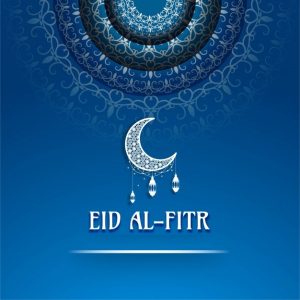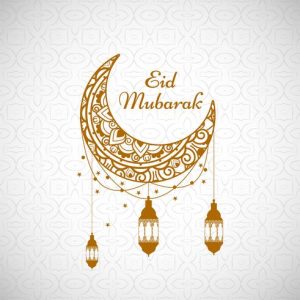
Eid-ul-Fitr (Id al-Fitr) is linked with the Holy month of Ramadan. It signifies the end of the month of fasting (the first day of the month of Shawal).
Eid-ul-Fitr is a unique festival. It has no connection with any historical event nor is it related to the changes of seasons or cycles of agriculture. It is not a festival related in any way to worldly affairs.
Its significance is purely spiritual. It is the day when the Muslims thank God for having given them the will, the strength and the endurance to observe fast and obey His commandment during the holy month of Ramadan.
This day, in Muslim world, brings rejoicing and happiness. The rejoicing is not, however, at the departure of the month of Ramadan; it is the happiness which man feels after successfully completing an important task.
It is celebrated for three days in a holiday called Eid-ul-Fitr (the Feast of Fast Breaking). Gifts are exchanged. Friends and family gather to pray in congregation.
The feast of Fitr is God’s reward for those who fast during the holy month of Ramadan. In this month, man should try to add to his true knowledge of God, do acts of charity for the needy, renew his beliefs towards his Lord and this will be a real Bairam Feast (Turkish word meaning festival) for him. The prayers of the day of Bairam a reason of unity and solidarity of Muslims all over the world. On this day do honor God for His endless and all-enhancing mercy.
The conception of Eid in Islam is not confined only to celebration extravagance, luxurious feasts, friendly handshakes and embraces. The Muslims should rather devote this day to the worship of God and should beseech Him to approve their virtuous deeds and forgive their sins. This is because the doors of God’s pardon are kept open this day and His Blessings are bountiful.

Eid al Fitr, meaning ‘Festival of Breaking the Fast’, celebrates the end of the holy month of Ramadan.
Eid is announced at the beginning of the tenth month of the Islamic calendar called Shawwal, which follows the month of Ramadan. The sighting of the moon is therefore important in announcing the start of a new lunar month.
Eid follows Ramadan, which marks the month in which the Qur’an was first revealed to the Prophet Muhammed, who Muslims consider the final prophet and who they honour by adding the term ‘peace be upon him’.
There are two Eids in Islam. Eid al Fitr, also referred to as the smaller Eid, and Eid al Adha or ‘Festival of the Sacrifice’.
Muslims celebrate Eid to show thankfulness to Allah for allowing them to finish and be able to fulfil their obligation by fasting, completing good deeds in the month that Muslims consider as being better than 1,000 months.
Eid is also an opportunity for Muslims to show thankfulness to God in the hope of having past sins forgiven and a chance to wipe the slate clean.
May 4 2022
Happy Eid-ul-Fitr (Festival of Breaking the Fast)
Eid-ul-Fitr (Id al-Fitr) is linked with the Holy month of Ramadan. It signifies the end of the month of fasting (the first day of the month of Shawal).
Eid-ul-Fitr is a unique festival. It has no connection with any historical event nor is it related to the changes of seasons or cycles of agriculture. It is not a festival related in any way to worldly affairs.
Its significance is purely spiritual. It is the day when the Muslims thank God for having given them the will, the strength and the endurance to observe fast and obey His commandment during the holy month of Ramadan.
This day, in Muslim world, brings rejoicing and happiness. The rejoicing is not, however, at the departure of the month of Ramadan; it is the happiness which man feels after successfully completing an important task.
It is celebrated for three days in a holiday called Eid-ul-Fitr (the Feast of Fast Breaking). Gifts are exchanged. Friends and family gather to pray in congregation.
The feast of Fitr is God’s reward for those who fast during the holy month of Ramadan. In this month, man should try to add to his true knowledge of God, do acts of charity for the needy, renew his beliefs towards his Lord and this will be a real Bairam Feast (Turkish word meaning festival) for him. The prayers of the day of Bairam a reason of unity and solidarity of Muslims all over the world. On this day do honor God for His endless and all-enhancing mercy.
The conception of Eid in Islam is not confined only to celebration extravagance, luxurious feasts, friendly handshakes and embraces. The Muslims should rather devote this day to the worship of God and should beseech Him to approve their virtuous deeds and forgive their sins. This is because the doors of God’s pardon are kept open this day and His Blessings are bountiful.
Eid al Fitr, meaning ‘Festival of Breaking the Fast’, celebrates the end of the holy month of Ramadan.
Eid is announced at the beginning of the tenth month of the Islamic calendar called Shawwal, which follows the month of Ramadan. The sighting of the moon is therefore important in announcing the start of a new lunar month.
Eid follows Ramadan, which marks the month in which the Qur’an was first revealed to the Prophet Muhammed, who Muslims consider the final prophet and who they honour by adding the term ‘peace be upon him’.
There are two Eids in Islam. Eid al Fitr, also referred to as the smaller Eid, and Eid al Adha or ‘Festival of the Sacrifice’.
Muslims celebrate Eid to show thankfulness to Allah for allowing them to finish and be able to fulfil their obligation by fasting, completing good deeds in the month that Muslims consider as being better than 1,000 months.
Eid is also an opportunity for Muslims to show thankfulness to God in the hope of having past sins forgiven and a chance to wipe the slate clean.
By english • Shia converts magazine • 0